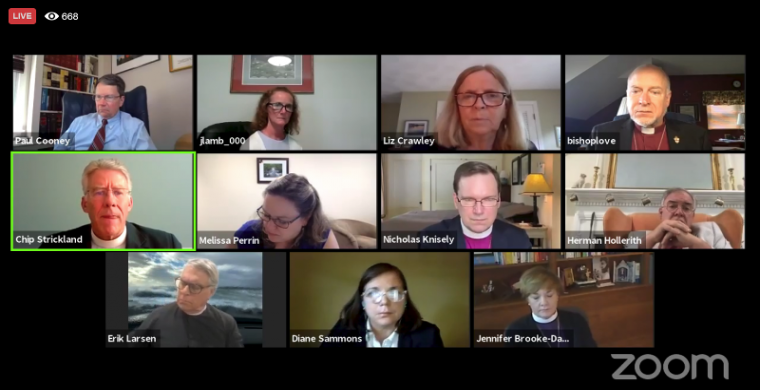Albany Bishop William Love Faces his Accusers
"My heart is breaking for the Church..." --- Bishop Love
By David W. Virtue, DD
www.virtueonline.org
June 11, 2020
In a low keyed but clearly partisan hearing, Albany Bishop William Love faced his accusers today charged with violating Canon B012 forbidding homosexual marriages in his diocese.
His attorney, The Rev. Chip Strickland, defended Bishop Love, saying his actions did not conflict with existing church canon law. Church attorney lawyer Paul Cooney demurred, saying that Bishop Love had violated church law. "Bishop Love upheld the worship set out in the marriage rites in the Book of Common Prayer," said Strickland.
The facts of the case were not in dispute or the theological validity of same sex marriage as TEC sees it. "The core issue is the church issuing a pastoral resolution that Bishop love has failed to obey the discipline of the church," said Cooney.
Cooney noted that B012 contains a provision for bishops who are theologically opposed to same-sex marriage to have other bishops provide pastoral support to the couple and celebrant, but Love refused to do this.
In his defense, Bishop Love made it clear that homosexual behavior was at issue, not people living together in (celibate) relationships. "I've tried to be pastorally sensitive to that. I have consistently met with same-sex couples and spoken to them personally. ... I do know how difficult this is for all of us and my heart is breaking for all of us. It's breaking for the church."
The hearing was conducted under the Church's Title IV disciplinary process, was originally to have taken place on April 21 in Colonie, New York, but was moved to a Zoom meeting due to the COVID-19 pandemic. It was presided over by convenor Bishop Nicholas Knisely of Rhode Island.
Historically, Title IV hearings are held when a member of clergy or bishops is accused of breaking their vows or violating the church's constitution and canons.
In the case of Bishop Love, the church argued that, by prohibiting clergy in his diocese from using the same-sex marriage rites approved for churchwide use by the 2018 General Convention, Love broke the vows he took when he was ordained a bishop to "conform to the doctrine, discipline, and worship of The Episcopal Church."
Strickland, who serves as the Diocese of Albany's chancellor, asserted that Resolution B012 does not hold canonical status, and that Love had not committed a canonical violation.
Strickland interpreted current church law, by saying that authorized trial rites (like the same-sex marriage liturgy in question) only have canonical status if they are proposed revisions to the Book of Common Prayer. Such had not been done, he said. "Bishop Love has not failed to conform to the doctrine of the church. He has upheld the doctrine of the church...the sacramental rites found in the Book of Common Prayer."
He argued that B012 does not fall under that category. He presented records from General Convention discussions in which the point was made that the language in a previous version of the resolution identifying it as a revision to the Book of Common Prayer was intentionally deleted for the final version.
Bishop Love said the nature of the trial will have a lasting impact on the church, this diocese, the Anglican communion and the wider Body of Christ.
Other members of the Title IV Hearing Panel included West Texas Bishop Suffragan Jennifer Brooke-Davidson, the Rev. Erik Larsen of the Diocese of Rhode Island, Melissa Perrin of the Diocese of Chicago and Retired Southern Virginia Bishop Herman Hollerith. The panel is responsible for reviewing evidence and taking testimony in a setting similar to a court hearing before it rules on any disciplinary action.
A number of Communion Partner bishops, faced with a Dec. 2, 2018, deadline for implementing B012, took the approach, such as Dallas Bishop George Sumner and Springfield Bishop Daniel Martins, that their congregations could invite bishops from neighboring dioceses to provide oversight if the rites were requested.
Bishop Love and Florida Bishop John Howard were the most vocal opponents of B012 during the General Convention debate, and while Central Florida Bishop Greg Brewer said nothing, he has allowed a neighboring bishop to perform a homosexual marriage for a woman priest in his diocese. Howard ultimately relented and offered clergy in his diocese a path forward with oversight from another bishop.
Only Bishop Love refused outright to allow B012 to be used in his diocese. In a Nov. 10, 2018, letter to his diocese, Love said he would not allow same-sex couples to be married by priests in the Diocese of Albany.
In the letter, Love cited Bible verses from Leviticus to Romans saying that sexual intimacy between two men or two women was never God's plan. He called homosexuality "sinful and forbidden" and called the long-simmering debate over same-sex marriage as an existential crisis for the church, which he argued, had been "hijacked" by a powerful, secular "Gay Rights Agenda."
The hearing lasted three hours. Bishop Knisely explained: After hearing the arguments from both sides on their motions that they would work to come to a decision as soon as reasonably possible. "When a decision has been reached, we will issue a written decision and then take whatever the next step will be appropriate. This is going to take a bit of time. it is not anticipated in any way that this will be ended this afternoon or over the next few days."
According to ENS, over 700 people watched the hearing via Facebook Live.
END














